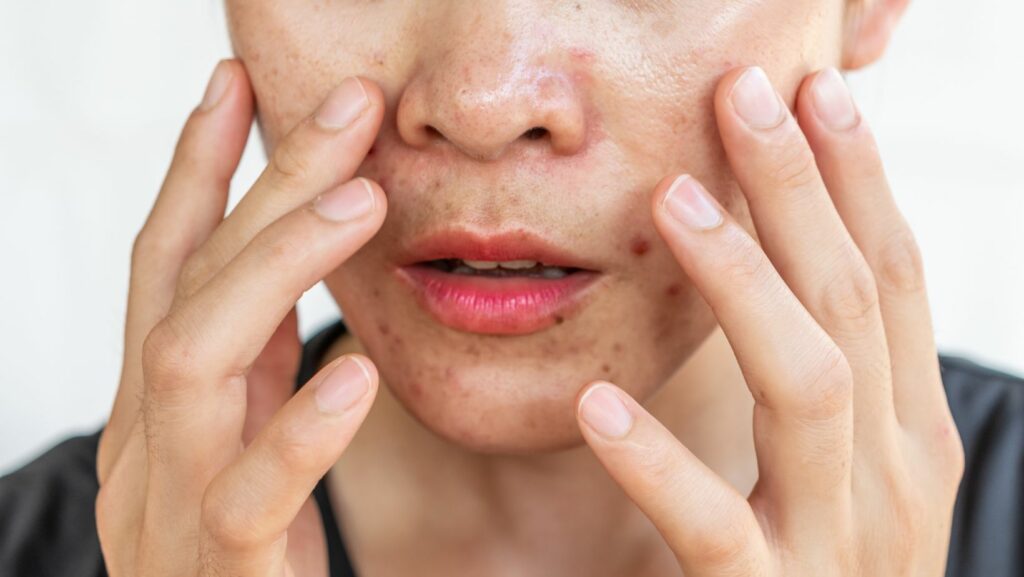Skin Care Oily Skin
Oily skin results from overactive sebaceous glands. These glands produce more sebum than necessary, leading to a shiny complexion and larger pores. Sebum, an oily substance, moisturizes and protects skin but excessive amounts can cause challenges. Genetics, hormones, and environmental factors often influence sebum production. Many teenagers and adults experience this issue, noting a familiar sheen by midday. This skin type is prone to acne as excess oil can clog pores. Enclosed pores create an environment conducive to bacterial growth and inflammation. Dermatologists often see this as a common concern for those with oily skin. In addition, oily skin sometimes becomes dehydrated if incorrect products strip it of essential moisture.
Balancing oil production is crucial. Products containing salicylic acid or benzoyl peroxide can regulate excess oil production. It’s essential to choose formulations labeled “non-comedogenic,” ensuring they don’t block pores. Lightweight moisturizers and gel-based sunscreens benefit this skin type, offering necessary hydration and protection without added greasiness.
Genetics play a significant role in oily skin, as sebaceous glands can be more active in individuals with a family history of this condition. Hormonal fluctuations also contribute, with increased androgen levels during puberty or menstrual cycles stimulating excess sebum production. Environmental factors, such as humidity and heat, can exacerbate oiliness by promoting sebaceous activity. Improper Skin Care Oily Skin can worsen this skin type; using harsh cleansers can trigger a compensatory increase in oil production. Overuse of comedogenic products clogs pores, leading to more visible oiliness and potential acne breakouts. A combination of these causes requires balancing oil control with hydration in any Skin Care Oily Skin regimen.
Essential Skin Care Routine for Oily Skin
Managing oily skin effectively involves understanding its unique characteristics and adapting skincare practices to address them. Establishing a consistent routine with appropriate products mitigates common issues like breakouts and shine. Selecting the right cleanser is crucial for oily skin. Foaming cleansers with salicylic acid clear excess oil and unclog pores. Gentle options prevent over-drying, which can trigger additional oil production. Cleansing twice daily, in the morning and evening, creates a clean base for further Skin Care Oily Skin steps.
Regular exfoliation removes dead skin cells and prevents pore blockages. Chemical exfoliants like glycolic acid or beta hydroxy acid offer deep exfoliation without abrasive scrubbing. Limiting exfoliation to 2-3 times a week minimizes irritation while maintaining skin clarity, avoiding exacerbation of oiliness.
Hydration is essential even for oily skin. Lightweight, non-comedogenic moisturizers avoid pore blockage while providing necessary moisture. Gel-based formulations quickly absorb into the skin, leaving a matte finish. Daily moisturizer application supports the skin barrier, reducing excess oil production as the skin compensates for lost hydration.
Recommended Skin Care Products for Oily Skin
Finding the right products is crucial for managing oily skin effectively. Opt for formulations that balance sebum without stripping moisture. Cleansers for oily skin should remove excess oil while maintaining balance. Foaming cleansers with salicylic acid target oily areas and help unclog pores without over-drying. Products like CeraVe Foaming Facial Cleanser offer gentle cleansing with added ceramides to support the skin barrier. Another option, Neutrogena Oil-Free Acne Wash, combines salicylic acid with a non-drying formula, ideal for maintaining clarity and controlling shine.
Toners refine pores and help restore the skin’s pH balance after cleansing. Alcohol-free toners with ingredients like witch hazel and niacinamide minimize pores and control oil. Thayers Alcohol-Free Witch Hazel Toner without harsh components keeps skin fresh and calm. Additionally, Paula’s Choice Skin Balancing Pore-Reducing Toner offers niacinamide benefits, promoting even skin tone and reduced pore appearance.
Moisturizers for oily skin should hydrate without adding greasiness. Lightweight, gel-based moisturizers absorb quickly and nourish. For instance, Neutrogena Hydro Boost Water Gel utilizes hyaluronic acid for deep hydration without a heavy residue. La Roche-Posay Effaclar Mat Moisturizer targets excess oil and offers mattifying effects, reducing shine throughout the day.

